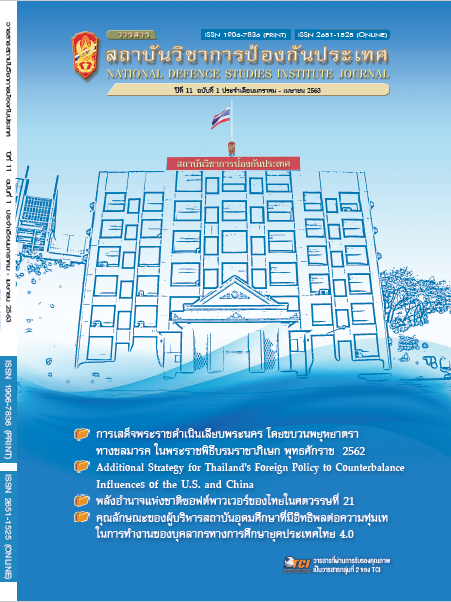A Causal Relationship Model of Military Vocational Teacher Competency in Vocational Education, Ministry of Defence
Main Article Content
Abstract
In this research, the objectives were to develop and validate a causal relationship model of military vocational teacher competency between the conceptualization and empirical data. The qualitative methodology was used in the research which comprising of three steps 1) studying influential factors affecting professional vocational education teachers, 2) constructing a causal model of professional vocational education teachers and 3) investigating the relevant of model and empirical data. The sample of 460 military vocational teachers were recruited from various vocational schools under The Ministry of Defence by stratified random sampling. The data was analyzed by using descriptive statistic, correlation, confirmatory factor analysis and structural equation model analysis through the program in Social Sciences.
The results showed that a causal relationship model of military vocational teacher competency had congruence with empirical data (χ2 = 40.58, df = 35, p = 0.23, RMSEA = 0.019, GFI = 0.99, AGFI = 0.95 and RMR = 0.006) The factor of a causal relationship model of military vocational teacher competency were motivation in the operation, personal, organizational commitment and management. Factors in the model could predict the variance of military vocational teacher competency at 82 percent. Moreover, the direct influential factors affecting military vocational teacher competency were work motivation factor and personal factor respectively, On the other hand, the indirect influential factors were personal factor, management factor and organizational commitment factor respectively.
Article Details
The articles, images, tables, graphs, written content, and opinions published in this journal are solely those of the authors and do not necessarily reflect the views or positions of the National Defence Studies Institute or its academic affiliates.
References
กระทรวงกลาโหม. (2560). นโยบายเร่งด่วนของรัฐมนตรีว่าการกระทรวงกลาโหม ประจำปีงบประมาณ พ.ศ. 2560.
กรุงเทพฯ: กระทรวงกลาโหม.
กระทรวงศึกษาธิการ. (2547). กฎกระทรวงว่าด้วยการจัดการศึกษาเฉพาะทาง พ.ศ.2547. กรุงเทพฯ: โรงพิมพ์คุรุสภา.
กรุณา โถชารี. (2560). รูปแบบความสัมพันธ์โครงสร้างเชิงเส้นของปัจจัยที่ส่งผลต่อสมรรถนะครูสังกัดสำนักงานเขตพื้นที่การศึกษา
ประถมศึกษาในเขตภาคตะวันออกเฉียงเหนือ (วิทยานิพนธ์ปรัชญาดุษฎีบัณฑิต). มหาวิทยาลัยราชภัฏสกลนคร.
ชัยอนันต์ สมุทวณิช. (2525). ยังเติร์กกับทหารประชาธิปไตย: การวิเคราะห์บทบาททหารในเมืองไทย. กรุงเทพฯ:ปรัชญาการพิมพ์.
ดวงนภา มกรานุรักษ์. (2554). อนาคตภาพของการอาชีวศึกษาไทยในทศวรรษหน้า (พ.ศ.2554-2564) (วิทยานิพนธ์ปรัชญาดุษฎี
บัณฑิต). มหาวิทยาลัยขอนแก่น.
ถวิกา เมฆอัคฆกรณ์. (2559). การพัฒนาโมเดลเชิงสาเหตุครูมืออาชีพทางอาชีวศึกษา (วิทยานิพนธ์การศึกษาดุษฎีบัณฑิต).
มหาวิทยาลัยเกษตรศาสตร์.
ธารวิทย์ เสวกดรุณทร. (2556). การพัฒนาแบบจำลองเชิงสาเหตุของความผูกพันต่อองค์การของอาจารย์ในหน่วยงานสังกัด
ส่วนการศึกษา กองบัญชาการกองทัพไทย (วิทยานิพนธ์ปรัชญาดุษฎีบัณฑิต). มหาวิทยาลัยเซนต์จอห์น
เนตรรุ้ง อยู่เจริญ. (2553). ปัจจัยเชิงสาเหตุที่ส่งผลต่อการมีส่วนร่วมในการประกันคุณภาพการศึกษาของครูสถานศึกษา
สังกัดสำนักงานคณะกรรมการการอาชีวศึกษาในเขตกรุงเทพมหานคร (วิทยานิพนธ์การศึกษามหาบัณฑิต).
มหาวิทยาลัยศรีนครินทรวิโรฒ.
พร ภิเษก. (2546). วัฒนธรรมองค์การและปัจจัยบางประการที่ส่งผลต่อประสิทธิผลโรงเรียนเหล่าสายวิทยาการของกองทัพบก
(วิทยานิพนธ์การศึกษาดุษฎีบัณฑิต). มหาวิทยาลัยศรีนครินทรวิโรฒ.
สจีรัตน์ แจ้งสุข. (2558). รูปแบบความสัมพันธ์โครงสร้างเชิงเส้นของปัจจัยที่ส่งผลต่อความเป็นครูมืออาชีพ ในสถาบัน
อาชีวศึกษาเอกชน ภาคตะวันออกเฉียงเหนือ. วารสารมหาวิทยาลัยนครพนม, 6(2), 33-43.
สถาบันวิชาการป้องกันประเทศ. (2558). รายงานผลการตรวจสอบและประเมินคุณภาพการศึกษาระดับกองทัพ. กรุงเทพฯ:
สถาบันวิชาการป้องกันประเทศ.
_______. (2559). คู่มือการประกันคุณภาพการศึกษา สถาบันการศึกษาของกองทัพระดับต่ำกว่าปริญญาตรี. กรุงเทพฯ:
สถาบันวิชาการป้องกันประเทศ.
_______. (2560). คู่มือการประเมินข้าราชการทหารที่ทำหน้าที่สอน เพื่อให้มีวิทยฐานะและเลื่อนวิทยฐานะ. กรุงเทพฯ:
สถาบันวิชาการป้องกันประเทศ.
สุวรรณา สุ่มเนียม และสุวรรณา นาควิบูลย์วงศ์. (2559). การพัฒนาโมเดลเชิงสาเหตุของปัจจัยที่ส่งผลต่อประสิทธิผลการ
ทำงานของครูอาชีวศึกษา. วารสารมหาวิทยาลัยราชภัฏธนบุรี, 10(2), 53.
สำนักงานเลขาธิการสภาการศึกษา. (2556). สภาพการจัดการศึกษาเฉพาะทางในประเทศไทย ปี 2556. กรุงเทพฯ:
กระทรวงศึกษาธิการ
วิภานันท์ ภวพันธ์ และสุวรรณา นาควิบูลย์วงศ์. (2558). การพัฒนารูปแบบความสัมพันธ์เชิงสาเหตุความผูกพันต่อองค์การของพนักงาน
ฝ่ายช่าง บริษัท การบินไทย จำกัด (มหาชน). วารสารวิทยาสารเกษตรศาสตร์ สาขาสังคมศาสตร์, 36(3), 498-509.
Alderfer, C. P. and Guzzo R. A. (1979). Life experiences and adults' enduring strength of desires in
organizations. Administrative Science Quarterly, 2(1), 347-361.
Allen, N. J. and Meyer, J. P. (1990). The measurement and antecedents of affective, continuanceand normative
commitment to the organization. Journal of occupational and organizational psychology, 63(1), 1-18.
Anderson, J. A. (2000). Explanatory roles of mission and culture: Organizational effectiveness in Tennessee’s
community colleges. Memphis: The University of Memphis.
Bass, R. M. (1990). Transformational Leadership Development. California: Consulting Psychologists Press.
Blase, J.D. (1987). Instructional Leadership Activity of Elementy Principals in Effective School.
Dissertation Abstracts International, 50(06 A), 1492.
DeBruyne, J. W. (2001). A Study to Identify the Factors Responsible for Job Dissatisfaction and Low
Teacher Morale (MS Thesis). University of Wisconsin-Stout.
Herzberg, F. (1959). The motivation to work. New York: Holy Wiley and Sons.
Hoy, W. K. and Miskel C. G. (2008). Educational Administration: Theory, Research, and Practice.
New York: McGraw-Hill.
Linderman, Merrenda and Gold (1980). Introduction to Bivariate and Multivariate Analysis. Retrieved
October 28, 2009, from http://www. llinois.com /content/apl
Maslow, A. (1970). Motivation and Personalit (2nd ed.). New York: Harpers and Row.
McClelland, D.C (1985). Human motivation. Cambridge: Cambridge University Press Management.
Mekarkakorn, T and Narkwiboonwong, S. (2017). A Synthesis Elements of Professional Vocational
Education Teachers in Thailand. Dusit Thani College Journal, 11(2), 271-253.
Prosser C. A. and Quigley T. H. (1949). Vocational Education in a Democracy. New Jersey: American Technical
Society.
Robbins and Judge. (1987). Organizational Behavior. New Jersey: Prentice-Hall.
Schermerhorn. (2003). Organizational Behavior (9th ed.). New York: John Wiley & Sons, Inc.
Scirbner, J. P. (1999). Professional Development: Untangling the influence of Work Context on Teacher
Learning. Educational Administration Quarterly, 35(2), 238-266.
Steers and Porter. (1991). Antecedents and outcomes of organizational commitment. Administrative
science quarterly, 221(1), 46-47.


